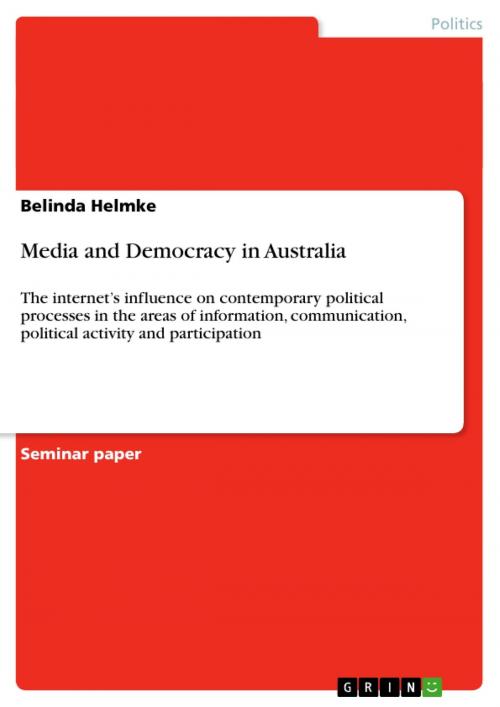Media and Democracy in Australia
The internet's influence on contemporary political processes in the areas of information, communication, political activity and participation
Nonfiction, Social & Cultural Studies, Political Science, Government, Public Affairs & Administration| Author: | Belinda Helmke | ISBN: | 9783640952397 |
| Publisher: | GRIN Verlag | Publication: | July 6, 2011 |
| Imprint: | GRIN Verlag | Language: | English |
| Author: | Belinda Helmke |
| ISBN: | 9783640952397 |
| Publisher: | GRIN Verlag |
| Publication: | July 6, 2011 |
| Imprint: | GRIN Verlag |
| Language: | English |
Seminar paper from the year 2002 in the subject Politics - International Politics - Region: Other States, grade: 1, Macquarie University, language: English, abstract: When speaking about democracy one has to be careful to distinguish between its two key areas: direct democracy and representative democracy. Direct democracy is largely associated with self-government of the people in ancient Greece. This Athenian democracy is something which, as population of states grew, was increasingly difficult to sustain. In, for example, Australia with a population of 19 million people direct self-rule which implies 'time-consuming and unwieldy procedures', with the likely effect of paralysing and not enhancing governmental decision-making processes, is largely unthinkable. Hence, today in the 21st century when one speaks of democracies what is largely meant is a representative democracy. Although remnants of direct democracy remain in aspects such as referendums, generally voters hand over their power in regular elections to representatives to rule on their behalf. The emergence of the internet has inspired many critics to believe that it can be the answer to overcoming what they see as the temporary solution of representative democracies. They believe that the new media, the internet, will lead to a future in which 'major policy decisions can be instigated, formulated, and decided by direct democracy.'
Seminar paper from the year 2002 in the subject Politics - International Politics - Region: Other States, grade: 1, Macquarie University, language: English, abstract: When speaking about democracy one has to be careful to distinguish between its two key areas: direct democracy and representative democracy. Direct democracy is largely associated with self-government of the people in ancient Greece. This Athenian democracy is something which, as population of states grew, was increasingly difficult to sustain. In, for example, Australia with a population of 19 million people direct self-rule which implies 'time-consuming and unwieldy procedures', with the likely effect of paralysing and not enhancing governmental decision-making processes, is largely unthinkable. Hence, today in the 21st century when one speaks of democracies what is largely meant is a representative democracy. Although remnants of direct democracy remain in aspects such as referendums, generally voters hand over their power in regular elections to representatives to rule on their behalf. The emergence of the internet has inspired many critics to believe that it can be the answer to overcoming what they see as the temporary solution of representative democracies. They believe that the new media, the internet, will lead to a future in which 'major policy decisions can be instigated, formulated, and decided by direct democracy.'















